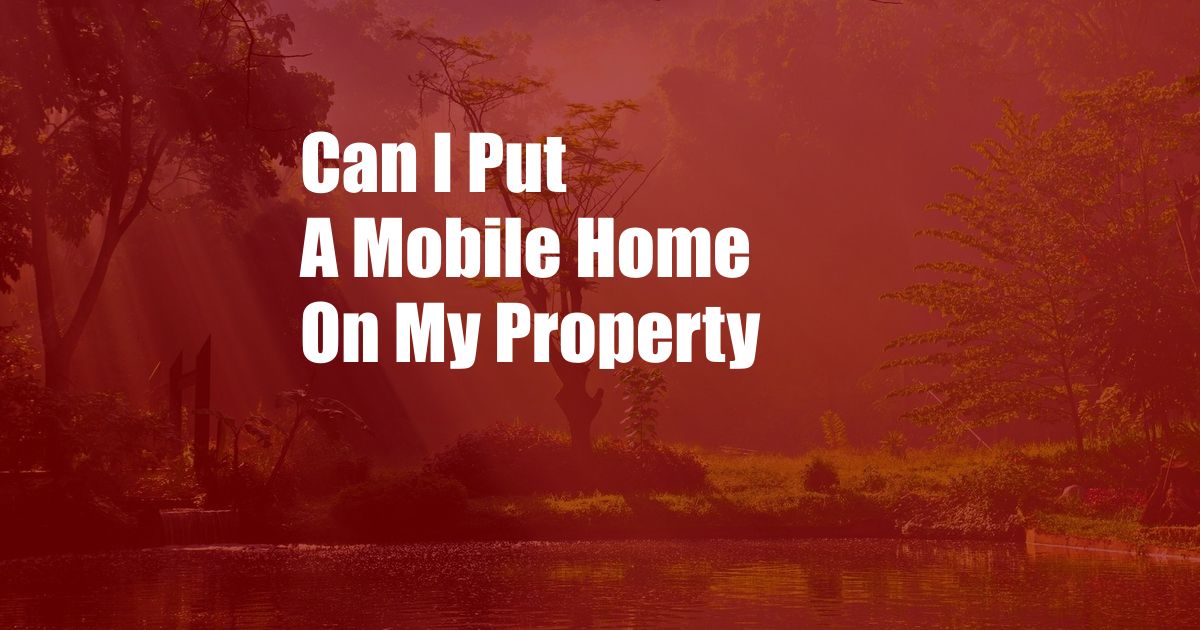
Can I Put a Mobile Home on My Property?
The allure of mobile home living lies in its affordability, flexibility, and potential for customization. But before you embark on this journey, it’s crucial to understand the regulations surrounding the placement of mobile homes on private property. This article delves into the intricacies of this topic, discussing the legal implications, zoning restrictions, and practical considerations you need to navigate.
Factors to Consider Before Placing a Mobile Home on Property
Zoning Regulations
The primary factor that determines the legality of placing a mobile home on your property is zoning laws. Zoning laws vary by municipality, so it’s essential to check with your local building department to ascertain the specific regulations for your area. Some regions may have strict ordinances that prohibit or restrict the placement of mobile homes. Others may have designated areas where they are permitted.
Building Codes
In addition to zoning laws, building codes also play a role in determining the suitability of a mobile home for your property. Building codes set forth standards for the construction and installation of mobile homes, including safety features, electrical systems, and plumbing. Ensuring your mobile home meets these codes is vital for obtaining building permits and ensuring the safety of your dwelling.
Private Covenants and Restrictions
Beyond zoning laws and building codes, private covenants and restrictions imposed by homeowners associations or neighborhood agreements can further limit the placement of mobile homes. These restrictions may be found in deeds or community rules and can range from outright prohibitions to specific design and placement requirements. It’s crucial to review these documents thoroughly before making any decisions.
Understanding the Process of Placing a Mobile Home on Property
Site Preparation
Once you have met the legal and regulatory requirements, the next step involves preparing your property for the mobile home. This includes ensuring the site is level, building a foundation or pad, and providing adequate access for utilities such as water, sewer, and electricity.
Mobile Home Delivery and Installation
The mobile home is typically delivered to your property on a flatbed trailer. A professional installer will position the home on your prepared site and secure it according to building code requirements. This process usually involves skirting the home, connecting utilities, and performing final inspections.
Financing Options
Financing a mobile home can differ from financing a traditional home. Specialized lenders offer loans specifically designed for mobile homes, and the terms and interest rates may vary depending on the loan type and your credit history.
Benefits and Drawbacks of Owning a Mobile Home on Property
Benefits
- Affordability: Mobile homes are generally more affordable than traditional homes.
- Flexibility: Mobile homes can be moved from one location to another, providing flexibility in case of relocation or changing needs.
- Customization: Mobile homes offer a wide range of customization options, allowing you to personalize your living space.
Drawbacks
- Zoning Restrictions: Zoning laws may limit the placement of mobile homes in certain areas.
- Resale Value: Mobile homes typically have lower resale value compared to traditional homes.
- Financing Challenges: Financing a mobile home can be more challenging than financing a traditional home.
Frequently Asked Questions about Mobile Homes on Private Property
- Q: Can I place a mobile home on any property?
A: No, zoning laws and private covenants may restrict or prohibit the placement of mobile homes on certain properties. - Q: What are the typical costs associated with placing a mobile home on property?
A: Costs can vary depending on factors such as site preparation, delivery, installation, and financing. Expect to pay anywhere from $10,000 to $50,000 or more. - Q: How do I finance a mobile home on property?
A: Specialized lenders offer loans specifically for mobile homes. Contact a reputable lender to discuss your financing options.
Before making a decision, carefully consider the zoning restrictions, building codes, private covenants, and financing options that apply to your situation. If you are uncertain about any aspect of the process, it is advisable to consult with local authorities, a reputable installer, or a real estate professional.
Are you interested in exploring mobile home living? Connect with us in the comments below to share your questions and insights.